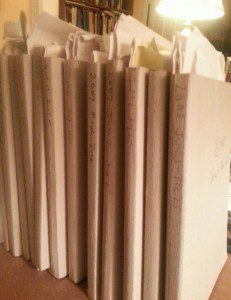 Thoreau journaled all the time. He wrote down his observations of nature, his thoughts and dreams, his notes on his constant reading. Most interesting, he journaled from his journals, picking over old volumes, plucking out promising bits and pieces, copying them out and marrying them up as fresh drafts. It became his habit “to work back over his journals…to reengage old subjects in the light of new interests, to revise and recopy his own earlier journal work, measuring, weighing, culling and sorting his materials…taking up earlier threads, reweaving and combining them.”[1]
Thoreau journaled all the time. He wrote down his observations of nature, his thoughts and dreams, his notes on his constant reading. Most interesting, he journaled from his journals, picking over old volumes, plucking out promising bits and pieces, copying them out and marrying them up as fresh drafts. It became his habit “to work back over his journals…to reengage old subjects in the light of new interests, to revise and recopy his own earlier journal work, measuring, weighing, culling and sorting his materials…taking up earlier threads, reweaving and combining them.”[1]
I can’t recommend this practice too highly. For any writer, as for Thoreau, it opens treasuries of material and above all it supports the writing habit. Playing around with old notes removes the terror of the blank page. When you dip into an old journal, you are never at a loss for a theme. The simple processes of selection, arrangement and retitling will fire the imagination. Before you know it, you’ll be in the midst of writing something new.
But the practice of journaling from journals is not only for writers. It is a marvelous tool for self-observation, for life navigation, and for constructing a personal encyclopedia of symbols. You’ll find many games you can play with your journal in my book Active Dreaming.
[1] Robert D. Richardson Jr., Henry Thoreau: A Life of the Mind. Berkeley: University of California Press, 1986, p. 107.]

